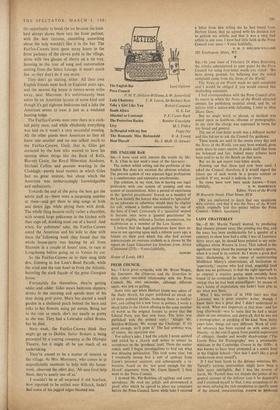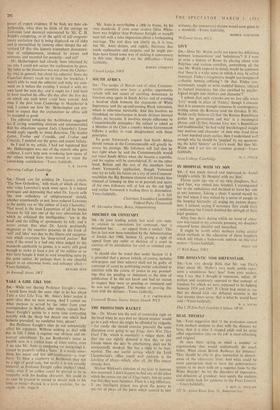LADY CHAITERLEY
SIR,—If Mr. Martin Turnell wanted, by producing that obscure pioneer essay (the printing was tiny, and the essay has been unobtainable for a quarter of a century), to show how bad a critic I was of Lawrence thirty years ago, he should have pointed to my unin- telligence about Women in Love. That indeed is the significant thing about the passage he actually quotes, when it is read in its context. As I wrote a great deal later, disclaiming, in the course of controverting Middleton Murry's observations, all inclination to 'superiority,' anyone who had tried, unguided (and there was no guidance), to find the right approach to so original a creative genius must certainly have found (if he continued to believe the trouble worth taking) that he had been unintelligent : by reason of one's habits of expectation, one hadn't been able to see what was there.
What I was certain of in 1930 (say) was that Lawrence was a great creative writer, though I knew there was a great deal I didn't understand in his work. What was important at that time—and for long afterwards—was to insist that he had a major claim on our attention, and above all, that he was not a pornographer, or anything of the kind. Now, thirty
years later, things are very different. Work of criti- cal advocacy has been carried on with some per- tinacity—at the cost (I speak from painful experience) of obloquy, slander and wordly disadvantage ('The Leavis Prize for Pornography' was a permissible
witticism in the Cambridge Granta in the 1930s : it was known to have been prompted at a senior level in the English School—'Not that I don't like a good smokeroom story meself).
If I had been harsh to the defence witnesses Mr. Turnell's curious intervention might have been a little more intelligible. But I was the reverse of harsh. Mr. Turtle!l does not dispute the justice of my general account of the defence (can it be disputed?)
and I confined myself to that. I was scrupulous to do no more, refusing the rich temptation to specify some of the absurd, conscienceless, evasive or irrelevant
pieces of, expert evidence. If he finds my tone ob- jectionable, what divs he think of the outrage on enWrenee •(and decency) represented by Mr. C. H. Rolph's comOring, or of the spirit of self-congratu- latory exaltation that is being displayed on all sides and is exemplified by (among other things) the ad- vertised LP disc (the historic triumphant demonstra- tion of enlightenment, rendered by actors and actresses, and recorded for posterity—and us)?
Mr. Hetherington had already been informed by me why I could not accept the explanation he gives. My letter to the Guardian was not about the Chatter- Icy trial in general, but about his editorial. Since the Guardian doesn't reach me in time for breakfast, I wasn't able to read the editorial and write my com- ment on it before the evening. I posted it with my own hand the next day, and it ought (as I told him) to have reached his office the day after the first day on which any such letter could have arrived. And even if the post from Cambridge to Manchester is bad, I cannot see how Mr. Hetherington can pre- tend to expect that the explanation he offers will b:-.• accepted as good.
The editorial rebuking the Archbishop suggested (as if saying something obvious and unanswerable) that his objections against Lady Chatterley's Lover would apply equally to Anna -Karenina, The Scarlet Letter, Troilus and Cressida, and Troilus and e'r iseyde. I pointed out the gross and patent fallacy. As I said in my article, I had not registered that Mr. Hetherington was one of the experts who gave evidence. i can't help now wondering bow many of the others would have bcen moved to reject the - astonishing assimilation.–=-Yours faithfully.







































 Previous page
Previous page